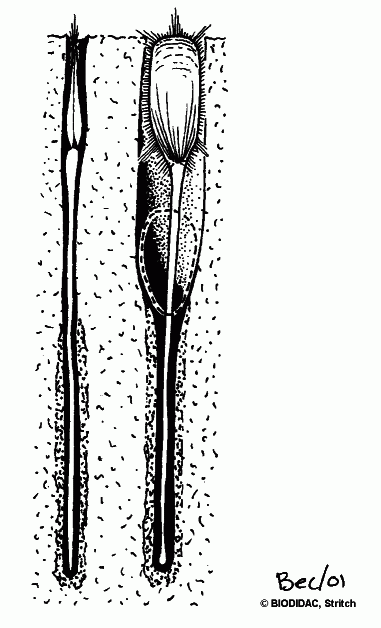
| Palaeos: |  |
Linguliformea |
| Brachiopoda | Lingulata |
| Page Back | Unit Back | Metazoa | Metazoa Dendrogram | Metazoa References | Pieces | Taxon Index |
| Page Next | Unit Next | Unit Home | References | Dendrogram | Glossary | Time |
BRACHIOPODA |-Linguliformea | |--Paterinida | `--Lingulata | |--Lingulida | `--Acrotretida | |--Discinida | `--Acrotretoidea `--+--Craniiformea `--Rhynchonelliformea |

Editor's note: Palaeos is a huge project, and hence updating it is beyond the scope of one person. For tis reason, and pending more original material, I have decided to cheat by copying (with minor editing, from Wikipedia MAK120107
The Lingulata is a class and clade of morphologically conservative brachiopods, that are little changed since the Cambrian. They represent very much the archetypal "inarticulate" brachiooids. The genus Lingula (Bruguiere, 1797) is traditionally considered very abcient, first appearing during the Ordovician period (but not the early Cambrian, although earlier related forms date back that far). However it has been argued that Lingula itself is recent, dating back nbo further than the Tertiary (the same could be said of Sphenodon, another tradtionally "living fossil" that has been shown to be more recent than usually believed).
The Lingulata have tongue-shaped shells (hence the name Lingulata, from the Latin word for "tongue") with a long fleshy stalk, or pedicle, with which the animal burrows into sandy or muddy sediments. They inhabit vertical burrows with the anterior end facing up and slightly exposed. The cilia of the lophophore generate a feeding and respiratory current through the lophophore and mantle cavity. The gut is complete and J-shaped.
The shells are composed of a combination of calcium phosphate, protein and chitin. This is unlike most other shelled marine animals, whose shells are made of calcium carbonate. The Lingulata are inarticulate brachiopods, so named for the simplicity of their hinge mechanism. This mechanism lacks teeth and is held together only by a complex musculature. Both valves are roughly symmetrical.
There are three orders: Acrotretida, Lingulida, and the early Paleozoic Siphonotretida
| Page Back | Page Top | Unit Home | Page Next |
page MAK120107 (Creative Commons Attribution license)